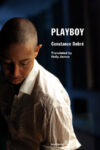
[Two Lines Press; 2020]
Tr. from the French by Jordan Stump
On the first day of September, a woman and her child staying near a village in the French countryside for the summer go out to buy eggs and never come back. As night falls, and no sign of them emerges, her husband, Herman, begins to panic. Their vacation has already run long; the family is supposed to return to Paris in the morning. Where could they have gone? A neighbor at a nearby farm claims not to have seen them; the village constable suggests he come back in the morning. Meanwhile, the idyllic summer weather has abruptly vanished, replaced by a somber drizzle and disquieting cold. The next day, Herman seeks out the mayor for help. But he finds an audience only with the strangely jovial president of the Chamber of Commerce, who informs Herman that none of the villagers will help him find his family. “The result is up to you, dear Monsieur,” the president adds. “You’ll have to become a villager yourself — invisible, insignificant — and above all, erase any memory of the fact that you’re a Parisian who’s stayed after summer.”
A study in claustrophobia, a locked-room mystery of sorts, a ghost story without the ghosts, a parable about tourism and power: all of these describe Marie NDiaye’s slippery, mesmeric That Time of Year, first published in France in 1994 as Un temps de saison and translated into English for the first time this year by Jordan Stump. One of NDiaye’s first novels, That Time of Year is nonetheless of a piece with her later works like Ladivine and My Heart Hemmed In: their pages all dripping with paranoia, tendrils of fog blurring the lines between reality and the uncanny. As Herman decides to remain in the village and search for his family, the story unfolds with the thwarted urgency of a dream, rife with odd details and detours while its central mystery grows faint in the background. This unresolved tension lends the novel an anxious, foreboding energy; as the critic Amy Gentry once wrote of Helen Oyeyemi, NDiaye “opens more parentheses than she closes.”
Central to the book’s unsettled atmosphere are the villagers themselves, who project a Stepford Wives manner of hospitality that appears to mask something much darker: a barely repressed hostility toward Herman’s outsider status. Cracks in their coldly polite facade lurk, partially glimpsed, in every encounter. Looking out from his hotel window, Herman spies an old woman watching him from the building opposite, “smiling insistently” and nodding as if in recognition. The hotel proprietors insist Herman leave his room unlocked — “people will wonder what you’re hiding,” he’s told — and assume a forceful, expectant intimacy with their guest. Then there are the murmurs about the powerful bloc of shopkeepers who run the village with an iron fist, and Herman’s constant sense of being surveilled, reminded at every turn he is a visitor who has literally outstayed his welcome. Alfred, the Chamber of Commerce president, informs Herman that embracing his discomfort is crucial to finding his family. “Someone’s always watching you,” he says. “You have to let yourself be seen, you have to appear . . . absorbed, melded with the life of this place . . . you have to lose every last bit of yourself, all right?”
These early scenes read like a Kafkaesque indictment of tourism: the fraught power struggle between the visitor and the resident, between a place as it is in all its messy complexity and what James Baldwin once described as its “image” — the idealized picture sold by movies and postcards and sunny travelogues. These exoticized expectations, Baldwin writes, are “so romantic and incoherent” that they create a sparking friction “between what [the visitor] desires and what the reality insists on.” Such desires often sprout from a deep well of privilege and even xenophobia, as researchers at Copenhagen Business School have found, as demonstrated by travelers who avoid local food in favor of chain restaurants or expect the regional industry to cater to their every whim. Such tension between the real and imaginary is unsustainable long-term, and when the fantasy can no longer be supported, Baldwin writes, “many people undergo a species of breakdown, or take the first boat home.”
When Herman violates the unspoken social contract of the village and lingers over “the border of summer” into fall, the transformation of the village into its true self triggers something very much like a breakdown in him. Unable to depart, he laments the cold, dreary weather that has descended on his beloved getaway. He complains about the village’s “archaic” customs, its oppressive dullness, its formerly hospitable residents who now show no interest in helping him solve his crisis. He considers the women he meets in terms of sexual conquest, assuming their personalities to be “incomprehensibly ordinary and flat . . . [without] the desire or capacity to hide anything at all.” Even their perceived ordinariness becomes a game for his edification; the more ordinary they appear to be, he reflects, “the less his longing would be satisfied, the more his imagination would chase after what he dimly saw as [their] essence . . . perhaps still hidden to him alone.”
And yet the longer Herman remains in the village, the more the lines of power become redrawn, like constellations shifting overhead. Herman, who has long considered the village and its inhabitants as foreign supporting characters in the story of his life, now finds himself thrust into a narrative where he is the supporting character, his foreignness exoticized and regarded with suspicion in turn. His status is weaponized against him: one villager maneuvers Herman into accompanying him to a tennis match in a nearby town, hoping to impress his competitor with his high-class Parisian partner. Others grow distant and cold when pressed for possible clues about his missing family, and others still raise the question of whether his wife even wants to be found. And indeed, as the novel progresses, Herman’s own desires grow increasingly faint as he becomes absorbed into the fabric of the village, crowded out by lives in the grip of abuse, depression, and the residual scars of the Second World War. By the end, NDiaye has inverted the foundational tenet of tourism — “I wish we could stay here forever!” — into a grayscale rumination on the long, lingering weight of communal trauma and the carefully hidden shards of a place’s violent history.
Like many other books published in 2020, That Time of Year feels eerily suited to our times. For one, the novel is an ideal quarantine read; clocking in at a brisk 130 pages, this atmospheric mystery can easily be devoured from cover to cover in a single rainy afternoon. But NDiaye’s tale is also a vivid portrait of ennui: the seductiveness and corrosiveness of boredom, the draining experience of being trapped in a single space, isolated from the routines and relationships of your life. The drowsiness of the village invites “a progressive indifference to action and mental labor,” which Herman observes as its uneventful existence wraps around him. Throughout the book, characters droop bodily in chairs, doze half-awake, drift off into a “dulled, larval inertia” as the misty drizzle envelops the village. At one point, taking a call from his employer back in Paris, Herman can barely tolerate the noise and din bursting from the other side of the line: “the restless, garrulous life he could hear going on through the phone had become alien to him, almost frightening.” He has become a “lost soul” here, swallowed whole by the village, “and lost souls never leave the place they choose or end up in.”
Reading these words in the midst of a pandemic, sunk into my couch for the thousandth day straight and sequestered from family and friends and stimulation, I wondered if I had become a lost soul myself — one overwhelmed by lethargy, wandering like a shade from one room of my apartment to the next. “Boredom without awareness or resentment slows the mind,” Herman reflects. “He was powerfully drawn to the possibility of an indolent but not ignoble, serenely oblivious degeneration.” Alone and separated from the outside world, my head heavy, the days ephemeral and indistinct, I knew exactly what he meant.
Will Preston‘s writing has been nominated for the Pushcart Prize and has appeared in publications across North America, including The Common, The Smart Set, Smithsonian Folkways, The Masters Review, and Maisonneuve. He lives in Portland, Oregon, and holds an MFA from the University of British Columbia. Visit him at willprestonwriter.wordpress.com.
This post may contain affiliate links.







